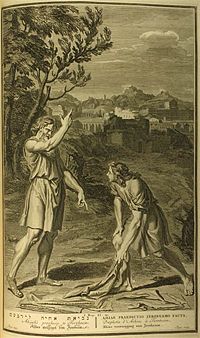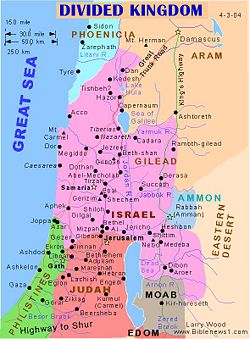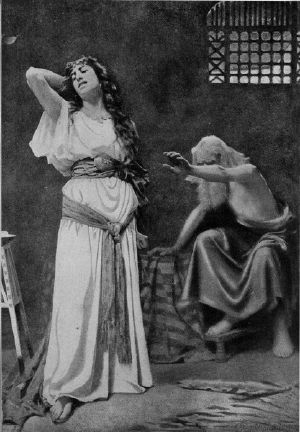Ahijah HaShiloni
Ahijah HaShiloni, also known as Ahijah the Shilonite, was a prophet of Shiloh (1 Kings 11:29 in the Old Testament. 14:2). He was called "the Shilonite" in the days of Rehoboam, to distinguish him from other men named Ahijah.
After King Solomon offended the prophetic ideal by erecting altars to non-Israelite gods, Ahijah was instrumental in the division of Solomon's domain into the northern Kingdom of Israel and the southern Kingdom of Judah. He commissioned the northern labor leader Jeroboam to become the future king of Israel, promising him that the blessings originally intended for the Davidic kings would be fulfilled in Jeroboam's lineage 1 Kings 11:31-39. However, when Jeroboam displeased Ahijah by bypassing Shiloh in favor or northern sanctuaries at Bethel and Dan, and when Jeroboam erected golden bull statues at these shrines, Ahijah broke with his protege and predicted God's doom upon his lineage 1 Kings 14:6-16.
Jeroboam gave testimony to the high esteem in which he was held as a prophet of God (1 Kings 14:2,3).
Biblical data
Shiloh
Shiloh was a major religious center in Israel during the time of the judges. The Tabernacle was set up at Shiloh semi-permanently during the later days of the period, and it was here that the Ark of the Covenant was usually housed, except when used as the standard of an Israelite army, or, later, when captured by the Philistines.
At Shiloh, the "whole congregation of Israel assembled," (Joshua 18:1). According to Talmudic sources, the Tabernacle rested at Shiloh for 369 years. [1] At some point during its long stay at Shiloh, the portable tent seems to have been enclosed within a compound or replaced with a standing structure with "doors" (1 Samuel 3:15) a precursor to the Temple.
The prophet and judge Samuel was raised at the shrine in Shiloh by the high priest Eli. Ahijah was Eli's grandson. Ajijah's father and uncle, however, were corrupt, bringing God's displeasure. Despite God's presence with Samuel, the Israelites suffered two defeats by the Philistines. During the second of these, the sacred Ark of the Covenant was seized. Ahijah's father Phinehas was slain, as well as his uncle Hophni, and his grandfather Eli died from a fall and shock upon hearing the news (1 Samuel 4). Although the Ark was eventually returned to Israel, it would no longer be housed at Shiloh.
Ahijah's background
Ahijah himself first appears among Saul's men as a young man at Gibeah during a battle against the Philistines. He is already allowed to wear the priestly ephod at this time, and has charge of the Ark of the Covenant. Saul commands that Ahijah bring forth the Ark, causing increased panic in the Philistine camp. The Israelites consequently win a major battle with God's help (1 Samuel 14).
Ahijah disappears from the record at this point until the reign of Solomon. In the interim Shiloh and the other local sites of Israelite worship fell under hard times as Solomon's Temple of Jerusalem became the official center of the Israelite religion.
Despite Solomon's prosperity and skills as an administrator, tensions between the northern tribes, which had been loyal to Saul, and the southern tribe of Judah, which had been loyal to David, remained. David had faced civil war between his forces and those of Saul's son Ish-bosheth in the early days of his reigned, followed by a rebellion by his own son Absalom, who received support from the northern tribes. Solomon's reign was relative peaceful, but he imposed forced labor on the northern tribes, increasing the tension between them and the south.
Solomon brought Ahijah into the picture again after he decided to appease his Moabite and Ammonite vassals by erecting altars to their gods near Jerusalem in honor of the princesses that the kings of these nations had offered to David as his wives. This toleration and state support of idolatry stimulated Ahijah to act as God's messenger to Jeroboam and ultimately spelled the end of David and Solomon's united kingdom.
Ahijah and Jeroboam
While still young, Jeroboam was promoted by King Solomon to be the chief superintendent of forced laborers from the tribe of "Joseph," referring normally to both Ephraim and Manasseh, working on projects in Jerusalem. Ahijah, whose Shilonite background would have made him familiar with the region of Ephraim, recognized Jeroboam's potential. Meeting him outside of Jerusalem, he dramatically appointed Jeroboam as the future leader of the Israelite rebellion and God's chosen king.
Ahijah the prophet of Shiloh met him on the way, wearing a new cloak. The two of them were alone out in the country, and Ahijah took hold of the new cloak he was wearing and tore it into twelve pieces. Then he said to Jeroboam, "Take ten pieces for yourself, for this is what the Lord, the God of Israel, says: 'See, I am going to tear the kingdom out of Solomon's hand and give you ten tribes. But for the sake of my servant David and the city of Jerusalem, which I have chosen out of all the tribes of Israel, he will have one tribe' (1 Kings 11:29-32).
Ahijah pledged that God would support Jeroboam and promised him a lasting dynasty, saying, in God's name: "If you do whatever I command you and walk in my ways and do what is right in my eyes by keeping my statutes and commands, as David my servant did, I will be with you. I will build you a dynasty as enduring as the one I built for David and will give Israel to you." (I Kings 11:38)
Solomon soon sought to kill the potential rebel, who, with Ahijah's support could be a real threat. Jeroboam fled to Egypt (1 Kings 11:29-40), where he remained for a length of time under the protection of Pharaoh Shishak, usually identified with Shoshenq I of Egypt.
Upon the death of Solomon, Jeroboam returned to Israel around the time that Solomon's son, Rehoboam, was crowned at the northern city of Shechem. There, Rehoboam rebuffed the requests of northern delegates to lighten their forced labor requirements. This provoked a rebellion under the old battle cry:
Ahijah had become a king-maker. The northern tribes rallied to Jeroboam, while Rehoboam was left with only the tribes of Judah and Simeon, whose territory was within Judah's borders (1 Kings 12:1-20). Rehoboam raised a powerful army to suppress Jeroboam's rebellion. However a prophet named Shemaiah—possibly an associate of Ahijah—proclaimed God's words as: "Do not go up to fight against your brothers, the Israelites." Rehoboam thus abandoned his plans for a full scale invasion. However, there are indications that another possible factor in Rehoboam's change of plans may have been an attack by Jeroboam's former protector, Shishak of Egypt. According to the biblical record, in the fifth year of Rehoboam's reign, Shishak and his African allies invaded Judah in a campaign so effective that even Jerusalem, the fortress capital, was taken and the Temple of Jerusalem was plundered (2 Chronicles 11:5-12).
Ahijah's prophecy of God's blessing being transfered from the house of David to that of Jeroboam should every likelihood of being fulfilled.
The altars at Bethel and Dan
In an effort to provide an alternative place of pilgrimage for Israelites who formerly offered their tithes and sacrifices in Jerusalem, Jeroboam then made the fateful decision to establish national shrines at Bethel and Dan. This act which lost him the support Ahijah and earned him the lasting enmity of the religious establishment at Jerusalem. Ahijah's home shrine at Shiloh was located only a short distance from Bethel. The choice of Bethel rather than Shiloh may thus have been a factor in Ahijah's disapproval. However, the biblical version states that the direct cause of God's rejection of Jeroboam was his erecting a golden (or bronze) bull-calf icon at each of these locations.
Nevertheless, Shiloh and Ahijah were still important to Jeroboam. When the king's son fell ill, he sent his wife to Shiloh to inquire about the prognosis. Ahijah, however, vehemently denounced his former protege, declaring God's words that:
I raised you up from among the people and made you a leader over my people Israel. I tore the kingdom away from the house of David and gave it to you, but... you have provoked me to anger and thrust me behind your back. Because of this, I am going to bring disaster on the house of Jeroboam. I will cut off from Jeroboam every last male in Israel—slave or free.
Ahijah added that as soon as Jeroboam's wife returned home, her son would die, which he did.
Legacy
Jeroboam was succeeded by his surviving son, Nadab, who was killed in a coup by the usurper Baasha of the tribe of Issachar, possibly because of the military reverses mentioned above. Like several of the other kings of Israel would later do to their predecessors' descendants, Baasha killed Jeroboam's whole family after taking power, thus fulfilling the reported prophecy of Ahijah years earlier.
Credits
New World Encyclopedia writers and editors rewrote and completed the Wikipedia article in accordance with New World Encyclopedia standards. This article abides by terms of the Creative Commons CC-by-sa 3.0 License (CC-by-sa), which may be used and disseminated with proper attribution. Credit is due under the terms of this license that can reference both the New World Encyclopedia contributors and the selfless volunteer contributors of the Wikimedia Foundation. To cite this article click here for a list of acceptable citing formats.The history of earlier contributions by wikipedians is accessible to researchers here:
The history of this article since it was imported to New World Encyclopedia:
Note: Some restrictions may apply to use of individual images which are separately licensed.


